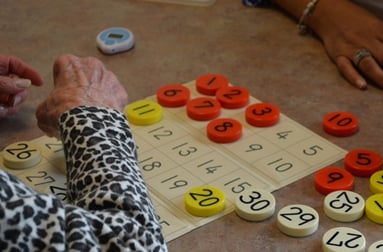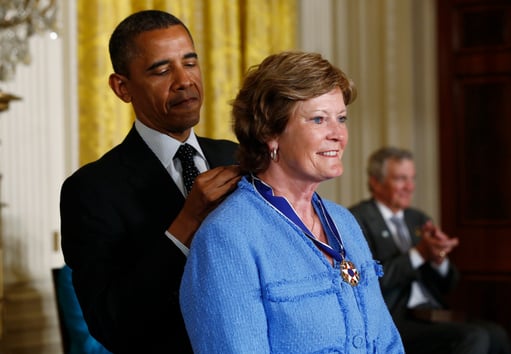America learned the sad news last month that one of its greatest coaches, the University of Tennessee’s indomitable former women’s basketball skipper, Pat Summitt, passed away from complications of early-onset Alzheimer’s disease.
It’s especially sad, because Summitt was relatively young. Her diagnosis came just five years ago, while she was still vital and coaching. It forced an early end to her brilliant, 38-year career, in which she achieved an unbelievable lifetime .841 winning percentage (1,098 wins to just 208 losses) and 8 NCAA Division I basketball championships.
She was widely considered not only one of the best basketball minds in the world, but one of the best mentors of young talent in any sport.
Unfortunately, as we know, Alzheimer’s disease can strike any among us, seemingly at any time. It occurs without preference to intelligence, professional acumen, status, social circumstance or overall physical health. It is a cruel condition — inevitably robbing those living with it of both physical and cognitive abilities.
Why haven’t we yet discovered a cure for Alzheimer’s? What does medical science currently understand about the disease, and what research is ongoing? Are there any effective strategies for fighting, let alone curing, Alzheimer’s-type dementia?
Today, let’s take inventory of where the fight against Alzheimer’s stands and discuss directions it may take in coming years.
Presedential Medal of Freedom Award - 2012 (Reuters/Kevin Lamarque)
The causes of Alzheimer’s disease aren’t well understood
The short answer: Our understanding of Alzheimer’s disease has advanced remarkably little over the past few decades. That’s not for lack of attention or effort on the part of the scientific community. Plenty of research into Alzheimer’s cause is ongoing, but definitive answers have been elusive.
Pat Summitt’s case is one of particular interest to dementia researchers — as is the case of this family in Colombia — because there are strong suspicions that genetics may play the most prominent role in early-onset Alzheimer’s cases.
But a number of factors may contribute to the onset of dementia or Alzheimer’s. In addition to genetics, lifestyle choices like diet and physical exercise, side effects of previous brain infections or head injuries, active inflammatory processes and even environmental exposures may play parts. No one is quite sure which may be foremost, to what degree, nor indeed if any of these are demonstrably causal.
Indeed, some reports on the subject stand completely in conflict. Does obesity, for example, put a senior at increased risk of developing dementia, or does it protect a senior from dementia?
“In some ways, Alzheimer’s is a bit like cancer,” wrote FiveThirtyEight health reporter Maggie Koerth-Baker. “During the past few decades, scientists have come to think of the big C as more like a whole alphabet of diseases. Although Alzheimer’s is still just one thing, it is useful to think of it as a single destination that can be reached by many roads.”
At the same time, the need is pressing to find all those roads and find ways to block them. As Koerth-Baker noted, 47.5 million people worldwide are living with some form of dementia and Alzheimer’s patients comprise 60 percent to 70 percent of all cognitive disorder patients.
As the populations of many Western and industrialized countries rapidly “gray” over the next decade, (due to the Baby Boom generation reaching senior maturity) a higher incidence rate is widely expected to present.
Treatment options are limited
Some research has indicated that regular programs of cognitive exercise may be associated with delayed onset or slower advancement of dementia.
There are promising cognitive therapies, like the Japanese-developed SAIDO learning program, which are now being trialed to determine efficacy in treating memory loss. Episcopal Retirement Services, in fact, was one of the first two retirement care providers in North America licensed to offer SAIDO.
To date, memory care programs represent the most cost-effective and expedient course of action for combating Alzheimer’s insipid advance. But cognitive exercise has not been demonstrably shown to be effective in every dementia case. It’s still, ultimately, an uphill battle.
There are FDA-approved drug therapies for Alzheimer’s. But, like memory care, results have been mixed.
Of the approved medications, three (donepezil, galantamine and rivastigmine) are cholinesterase inhibitors, which work by slowing down the process that breaks down acetylcholine and other chemicals that function as key neurotransmitters in the body.
The fourth approved Alzheimer’s drug therapy, memantine, is an NMDA receptor antagonist. It works by regulating the activity of glutamate in the brain.
When glutamate attaches to brain cell surfaces at points known as NMDA receptors, calcium is permitted to enter the cell. That’s normal. The presence of ionic calcium is important for cell signaling — it forms part of the chemical gradient that our neurons (the specialized cells that form the nervous system) use to transmit electrochemical pulses to each other.
In Alzheimer’s patients, excess glutamate can be released from damaged cells, leading to chronic overexposure to calcium. That’s thought to accelerate cell damage. Memantine partially blocks NMDA receptors; it’s typically used in tandem with donepezil to slow Alzheimer’s progression.
But there’s no cure. There’s no way to reverse damage that has occurred. And there’s not even a way to completely arrest Alzheimer’s.
Right now, all Alzheimer’s patients inevitably succumb to the disease — either quickly, like Summitt did, or slowly, over a decade or more, as occurred in Ronald Reagan’s case. Most cases fall somewhere in between. And there is much research still to be done before we’ll be able to declare any real, therapeutic victories.
Additional awareness and funding are best bets for furthering research
No one knows yet whether there is one “smoking gun” cause of dementia or Alzheimer’s. No one knows if a cure will ever be developed. But the scientific community is certainly hopeful that a reliable treatment will be found in coming years.
If you’re a senior in the early stages of dementia or Alzheimer’s, or if you are the caretaker of a senior who needs memory care, the best course of action would be to consult your doctor. He or she may want to refer you to a neuroscientist or a gerontologist.
And keep in mind that you may eventually need long-term, residential memory care. If you live in Cincinnati, Episcopal Retirement Services’ Marjorie P. Lee community does have a dedicated memory care program that might fit your future needs.
But don’t just take our word for it. Be sure to visit a variety retirement communities and nursing homes in the Cincinnati area, to find the one that would best fit your needs. Communicate your wishes to your loved ones and record them in a living will, so that they’ll be known if and when residential memory care becomes necessary.














